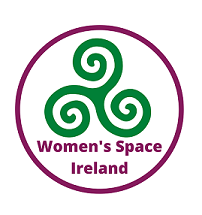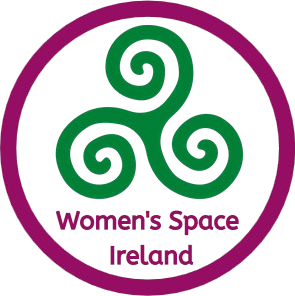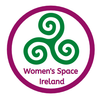Pledges to gender identity ideology
Next week Dublin City Council's Comhairle na nÓg is to send out “pledge packs” to 22 schools which expressed an interest in having one as part of the chosen LGBTI+ topic this year. What's BeLonG To's role in this?
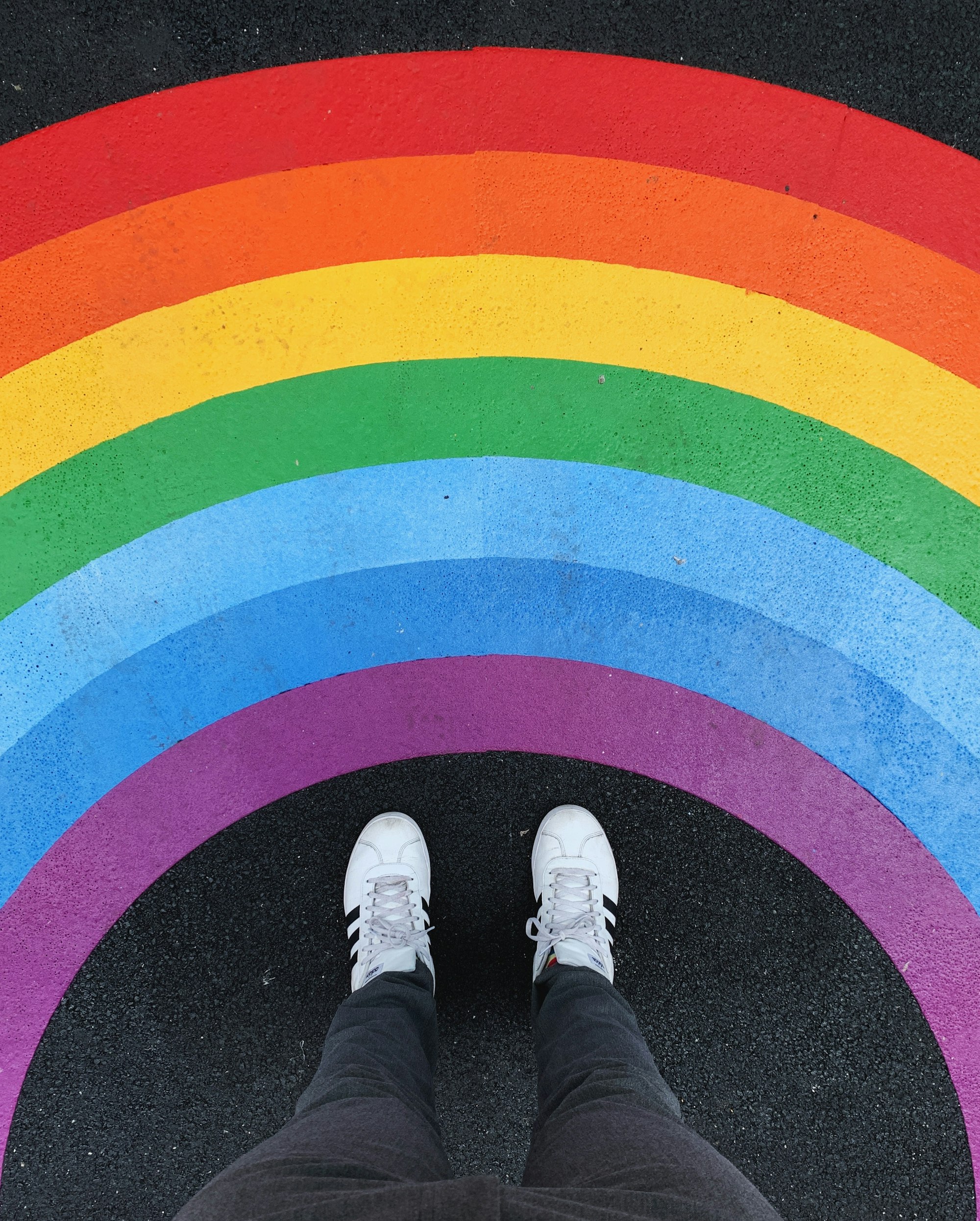
Pledges
pledge - bind (person, oneself) by solemn promise
"Dubliners asked to take pledge to mark Pride" said Dublin City Council of Dublin City Comhairle na nÓg's initiative in June. The Comhairle is for 12-17 year olds and has 47 members, and there's a Comhairle na nÓg in 31 local authorities.
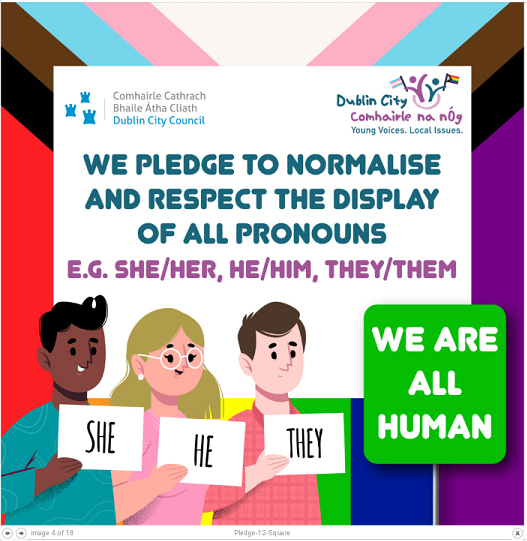
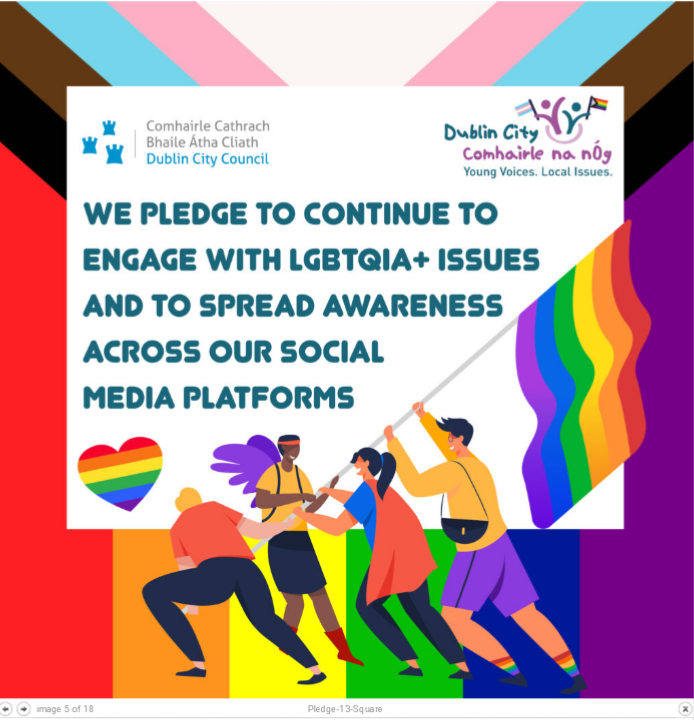
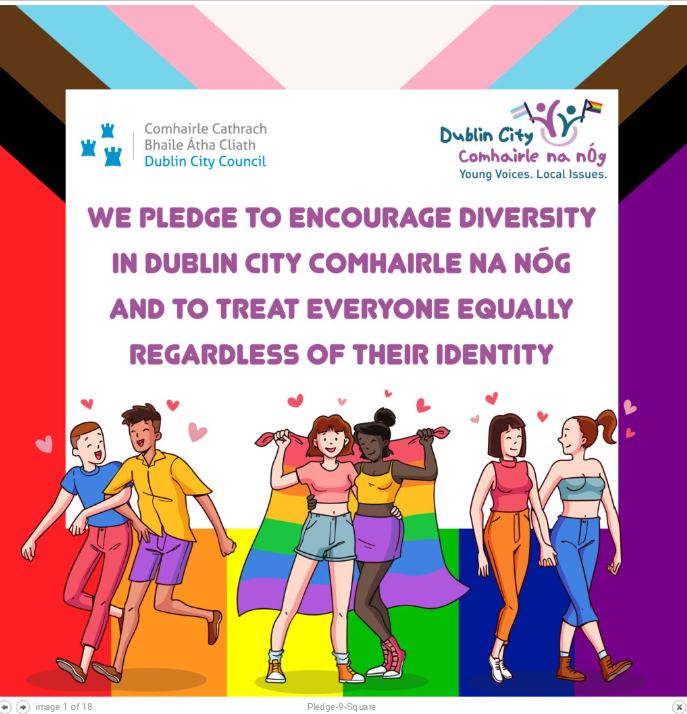
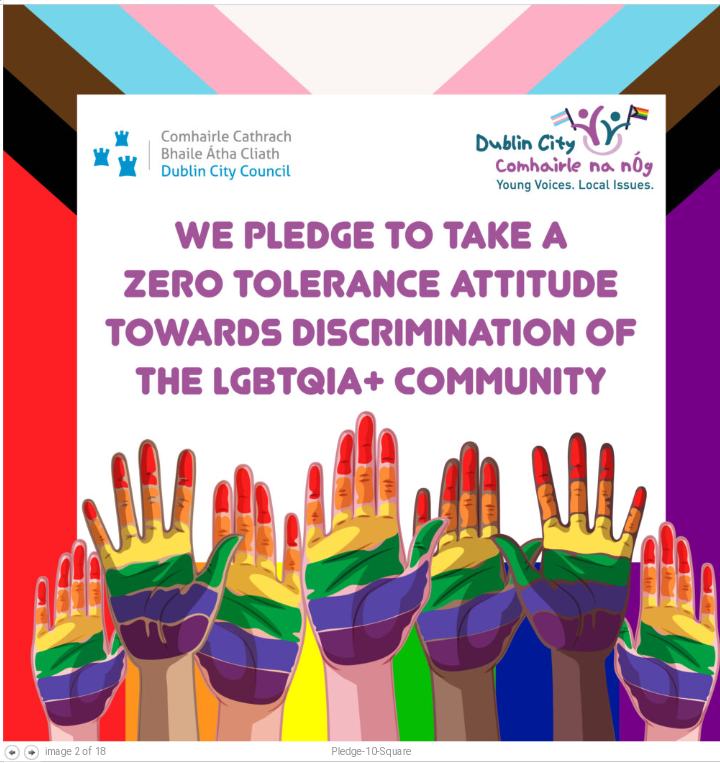
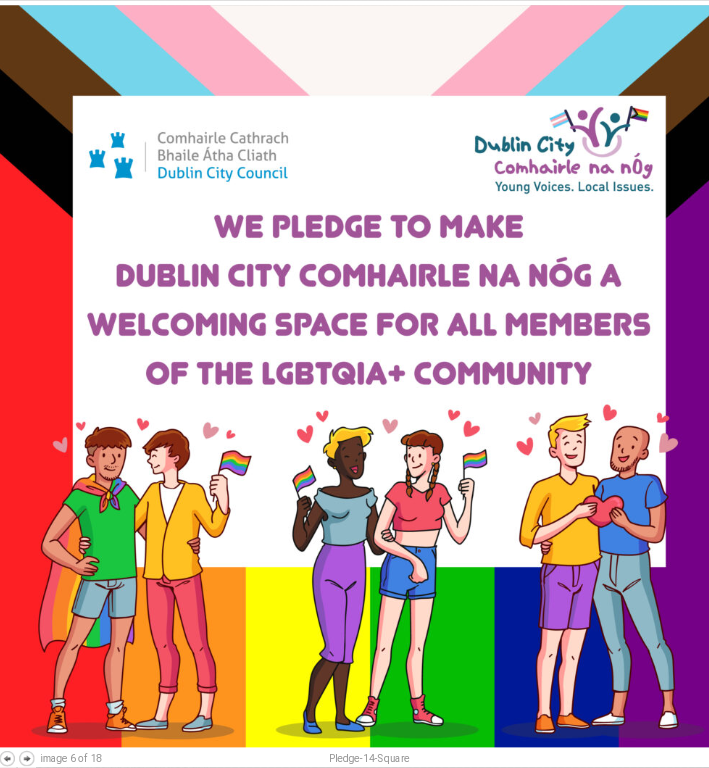
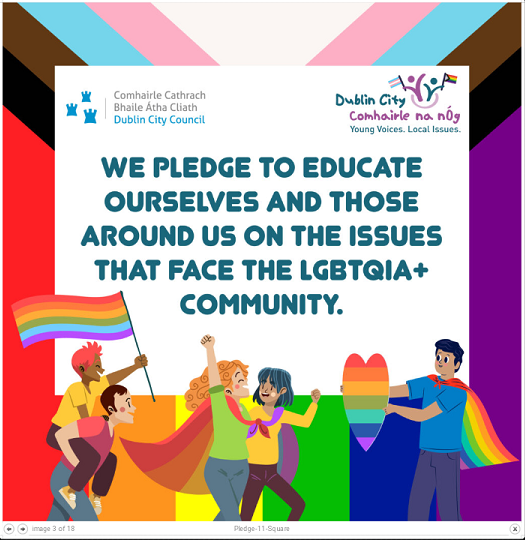
Next week Dublin City Council's Comhairle na nÓg is to send out “pledge packs” to 22 schools which expressed an interest in having one as part of the chosen LGBTI+ topic this year. 26 schools were invited but four declined.

These packs include a “school pledge”:

What's in the "pledge packs"?
Dublin City Council explained that
Contained in the packs are LGBTQIA+ bags, badges and bookmarks, which students can take if they wish.
As part of the pack there is also a commitment/pledge poster which calls on schools to take a look at a number of actions that the schools involved may choose to be part of. They can simply display the poster somewhere in their building if they would like to. The poster calls on the schools to look at taking a number of actions in support of LGBTQIA+ youth within the school setting:
-Partake in Stand Up Awareness Week
-Review their anti-bullying policy with the intent of including an LGBTQIA+ section
-Encourage a safe and supportive space for students to come out e.g. engaging with students, Student Council and the Board of Management.
There is no requirement on students or the school to physically sign-up to the pledge or to endorse the actions listed.
Organisations engaged on the LGBTI+ topic this year include BeLong To, ShoutOut, the LGBTI+ Youth Forum and the Department of Children, Equality, Disability, Integration & Youth Reform Strategy and Participation Unit. BeLonG To organises the Stand Up Awareness Week each year.
BeLonG To Youth Services Limited

BeLonG To is a Company Limited by Guarantee. The annual report for last year 2020 explains that the focus of the Company is lesbian, gay, bisexual and transgender (LGBT+) young people and their families.
BeLonG To is also registered with the Charities Regulator. Information can also be found about the organisation, its finances and governance at Benefacts. All eight Board members
"..work voluntarily and do not receive any remuneration as required by the Charities Act, 2009. They are entitled to reimbursement for out-of-pocket expenses in the discharge of their functions as Trustees".
Their skill sets include PR and communications, government and public service, fundraising, organisational development, employment law and risk management.
The longest serving director is Professor Maurice Devlin, Head of the Department of Applied Social Studies at Maynooth University, where he also holds the Jean Monnet Chair in European Youth Studies. His sector knowledge is listed as policy and research. The annual report adds “A former youth worker, he has researched and published widely in youth work, youth policy and the sociology of youth.
“Since 2003, we have worked with LGBTI+ young people, between 14 and 23 years, to create a world where they are equal, safe, and valued in the diversity of their identities and experiences,”
However last year's annual report indicates that some of the young people they reach are less than 14.

Register of Lobbying
There are 83 returns of lobbying to public officials and Government ministers made to the Standards in Public Office Commission (SIPO) which it registered with just a month after Ireland's self-id Gender Recognition Act was passed in July 2015.
Its main activities on the register are listed as “youth work/childcare” but this includes lessons for primary school children about "gender" and the Gender Recognition Act and lobbying the Government to introduce self-id for children under the age of 16 as it did in its submission to the Government's Gender Recognition Act review group in 2018:

Surprisingly the submission from BeLonG To managed to get the name of the Act wrong a number of times, calling it the “Gender Identity Act”.
The Executive Director of BeLonG To Youth Services, Ms Moninne Griffith, a former chairperson of the National Women's Council of Ireland (NWCI) was also the chairperson of the Review Group. She said at the time that she was “honoured to take on this role of Independent Chair” (this was subsequently changed to "external chair" before the sending out of a departmental press release.)
Membership of the Review Group was composed of civil servants, some of whom changed over the course of the group's work, and three representatives of LGBT organisations as well as Dr. Tanya Ní Mhuirthile of the School of Law and Government at Dublin City University, a legal consultant to and former director of Transgender Equality Network Ireland (TENI).
In June 2018 the Review Group “agreed that a system of gender recognition should be introduced for children of any age.”
Definitions used
In last year's annual report for BeLonG To lesbian appears five times, bisexual five times, transgender eight times, non-binary 13 times and gay 15 times. Trans appears 82 times.
BeLonG To offers some curious definitions in its section for parents and carers. It says a lesbian is "A woman who is mainly attracted to other women"and to be gay is “Someone who is mainly attracted to people of the same gender”. A bisexual is "Someone who is attracted to people of the same gender and also to people of other genders."
Transgender is "A term describing a person’s gender identity that does not match their assigned sex at birth.” Sex as we all know is observed at birth.


"I" is for "intersex"
"Supporting Lesbian, Gay, Bisexual and Trans Young People" is the BeLonG To banner. But on the organisation's website is added the “I” for “intersex”.
Intersex doesn't appear at all in the 2020 annual report.
“We also advocate and campaign on behalf of young LGBTI+ people,”
says BeLonG To which made recommendations regarding “intersex” people in its submission to the Gender Recognition Act Review Group of 2018.
Those with very rare genetic conditions commonly called “intersex” but more properly known as DSDs or VSDs – differences or variations in sexual development - regularly ask not to be used by the gender identity ideology lobby.
DSD affects around one in every 4,500 births, in other words, around 130 babies in the UK every year. But since DSD is a collection of different conditions, some variations are more common than others.
Using Ireland's birth rate of 55,959 last year there would have been approximately 12 babies born with a variation in sexual development here. DSDFamilies, a information and peer support charity for families in the UK, explains that
DSD is an umbrella term used to describe around 40 different physical conditions affecting the reproductive and genito-urinary development of a baby in the womb.
Funding
The 2020 annual report shows that 48% or €720,604 of BeLonG To's income was from central government grants with the balance of €774,177 from other sources e.g. corporate. This year for instance BeLonG To is one of the organisations benefitting from Disney's funding.
In February BeLonG To announced a partnership with the Dropbox Foundation. This includes receiving "unrestricted funding from the organisation". In addition Dropbox also offered voluntary assistance from its staff:
“Employees will be given time to help BeLonG To with impactful projects, providing increased capacity and expertise for a range of possible needs across the business.”
Ms Moninne Griffith, CEO of BeLonG To explains in this video produced by the Dropbox Foundation how
"It's still not all rainbows being LGBT especially if you're a young person, especially if you're living in a home where you're either not out or you are out and you're not accepted. It's about providing safe spaces for young LGBT people to meet other people having similar experiences and get that peer support."
In June the Dropbox Foundation heard from BeLonG To how it had
"..conducted a survey called Life in Lockdown that showed the well-being of LGBTI+ young people has worsened under lockdown in Ireland due to isolation, prejudice, and discrimination."
Earlier in the 2020 annual report the chair of the Board of Directors, Nikki Gallagher, had said
"During the pandemic, many LGBTI+ young people are confined to spaces that are unsupportive of their sexual orientation or gender identity, such as family homes."
ILGA Europe
BeLonG To is one of over 600 organisations from 54 countries in ILGA Europe, which works for "equality for lesbian, gay, bisexual, trans and intersex people".
"ILGA-Europe are a driving force for political, legal and social change in Europe and Central Asia."
Financial support to ILGA Europe is provided from the Arcus Foundation, the Government of the Netherlands, the Sigrid Rausing Trust amongst others.
BeLonG To is also one of the organisations which contributed to the report "Only adults? Good practices of legal gender recognition for youth" produced by IGLYO, the International Lesbian, Gay, Bisexual, Transgender, Queer & Intersex (LGBTQI) Youth and Student Organisation in partnership with Trustlaw, Dentons Europe LLP, and the NextLaw Referral Network in November 2019:

Stand Up Awareness Week
A guide to Stand Up will be sent to every second-level school and Youthreach in Ireland by October 17th, with a toolkit and posters available to download.
"Stand Up Awareness Week is a time for second-level schools, youth services, and Youthreach in Ireland to join us and take a stand against homophobic, biphobic and transphobic bullying."
BeLonG To reports that it reached 68% of secondary schools last year, up from 57% in 2019 and 43% in 2018. It hopes to reach 70% of secondary schools this year.
Parents concerns
However parents have queried some of the information provided by BeLonG To in its material provided:

Described as a "Universal LGBT+ awareness and skills training for professionals working with young people in community or education settings" this handbook says that

It's not clear whether or not this is in fact in line with our current equality legislation which provides for an exemption under gender (defined as male and female) in certain circumstances, e.g. where there may be a need for privacy. This advice also seems to ignore the rights of other children who might feel uncomfortable or even fearful if expected to share with a young person of the opposite sex.
Allowing boys to compete with girls in sports may run the risk of injury to girls:

This provision doesn't appear to take into account the fact that girls may not wish to share spaces in which e.g. they may be undressing, with boys who have a female "gender identity". This also may not be in line with the protections for gender, meaning sex, in our equality legislation:

Of serious concern is that the guidance recommends that those working with young people should not "Out them if their parent/guardian asks directly - say you don't know..."

Last month The Telegraph reported that children as young as four in Scotland will be able to change their name and gender at school without their parents’ consent under new LGBT inclusivity guidelines drawn up by the Scottish Government with help from LGBT advocacy groups such as Stonewall. The article added:

Links with the Proud Trust UK
BeLonG To runs youth groups for LGBTI+ young people to connect, get information, and receive support.
"In April, we developed a digital youth work strategy with the help of our incredible friends and allies at The Proud Trust UK."
"There are safeguarding risks associated with bringing new young people to a digital space. To minimise risk and follow best practice for child protection, we introduced a ‘New Young Person’s Project’ to streamline new service users.."
"In 2020, following The Proud Trust’s advice, we solely engaged in positive and fun activities with group participants."
The UK's Proud Trust sells the "Dice Game":

Parents and teachers need to ask if an organisation such as BeLonG To is an appropriately independent body to have such a prominent role in youth activities, and in particular if it should be allowed circulate materials in schools promoting gender identity ideology to children from primary school upwards.
Last weekend Mr Karl Martin, a letter writer to The Irish Times wrote:
"Unfortunately, NGOs tend to be leftist and achingly progressive in outlook. They are not necessarily representative of public opinion. Despite this, their CEOs and spokespeople enjoy unrivalled access to the media, politicians and public servants. They wield huge influence behind the scenes over everything from bicycle lanes to the Government’s forthcoming “hate speech” Bill. This is incredibly dangerous as it undermines faith in democracy for those of us outside the NGO bubble."
